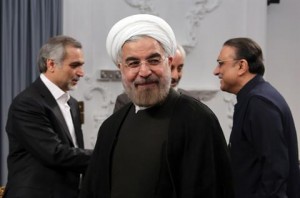 The U.S. House of Representatives has a peculiar way of welcoming Iranís new president. Just days before todayís inauguration of Hassan Rohani, who has vowed toimprove relations†with the outside world and bring transparency to†Iranís nuclear program, the House†approved†legislation that would impose the harshest sanctions to date on Iran.
The U.S. House of Representatives has a peculiar way of welcoming Iranís new president. Just days before todayís inauguration of Hassan Rohani, who has vowed toimprove relations†with the outside world and bring transparency to†Iranís nuclear program, the House†approved†legislation that would impose the harshest sanctions to date on Iran.Itís possible to doubt both the sincerity of Rohaniís pledges (or at least his ability to follow through on them) and the value of the Houseís legislation. Paradoxically, the voteweakens the hand†of President†Barack Obama†as he tries to prevent Iran from acquiring nuclear weapons -- preferably without resorting to war.
About Rohani: Itís true that he will serve Supreme Leader†Ayatollah Ali Khamenei, whom he has known since their military service in the 1970s and who has seconded none of Rohaniís comments. Itís also true that Rohani is no friend of the West. A cleric and an activist in the revolution that created the Islamic Republic, Rohani is†part of†the conservative establishment in Iran.
Nevertheless, Rohani is now the Iranian president, and at a time when the window for a negotiated settlement is closing. In its†latest assessment, the Institute for Science and International Security estimates that Iran will be able to produce, undetected, enough weapon-grade uranium for a nuclear bomb by mid-2014.
It may be that Iran is hellbent on getting the bomb. Or it may be that Khamenei means it when he says that such a weapon is un-Islamic (Rohani says the same) and that he would be content, provided sanctions were lifted, with the soft power conferred by an internationally supervised civilian nuclear program with a limited enrichment capacity. Or it may be that Khamenei prefers not to develop nuclear weapons at all, but thinks he must to protect the Iranian regime, which he believes the U.S. wants to oust.
Given the lack of transparency in Tehran, the U.S. may never know which of these hypotheticals is true. One way to find out -- that is, to get†Iran†to be more forthcoming about its intentions -- may be for the U.S. to become more straightforward about its own. Itís unreasonable to expect Iran to make the first move. The U.S. is the more powerful country; Iran has more to fear in their confrontation.
The Obama administration might start by showing Iran greater respect: Stop calling it a ďpariah state,Ē for example. The administration could also broadcast plainly that it doesnít seek regime change in Tehran. The president could promise that as long as nuclear negotiations progress, he will veto any new sanctions passed by Congress and desist from issuing sanctions through executive order. Officials could let it be known how sanctions would be reduced and what security guarantees there would be if an agreement with Iran were reached.
The U.S. has already said that it will accept a limited enrichment capacity in Iran, once the country meets its obligations to the†International Atomic Energy Agency. Obama would do well to emphasize this point: The importance of a clear U.S. acknowledgement of what Iran calls its ďright to enrichĒ canít be overstated, although the U.S. neednít use that controversial term.
If itís soft power Iran seeks, then enrichment is essential to its leaders. Yes, Iran could still build a bomb, but with a restricted and supervised enrichment program, the IAEA would have considerable warning.
That potential for Iran -- and the promise, for those worried about such potential being fulfilled, of sufficient notice -- is the intersection where a deal is possible. Reaching it will require convincing Iran that U.S. policy goes beyond imposing ever more punitive sanctions.
By Bloomberg
The Iran Project is not responsible for the content of quoted articles.










